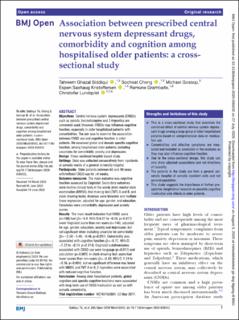| dc.contributor.author | Cheng, Socheat | |
| dc.contributor.author | Gossop, Michael | |
| dc.contributor.author | Kristoffersen, Espen Saxhaug | |
| dc.contributor.author | Grambaite, Ramune | |
| dc.contributor.author | Lundqvist, Anders Christofer | |
| dc.date.accessioned | 2020-08-31T09:10:00Z | |
| dc.date.available | 2020-08-31T09:10:00Z | |
| dc.date.created | 2020-07-30T13:11:29Z | |
| dc.date.issued | 2020 | |
| dc.identifier.issn | 2044-6055 | |
| dc.identifier.uri | https://hdl.handle.net/11250/2675641 | |
| dc.description.abstract | Objectives Central nervous system depressants (CNSDs)
such as opioids, benzodiazepine and Z-hypnotics are
commonly used. However, CNSDs may influence cognitive
function, especially in older hospitalised patients with
comorbidities. The aim was to examine the association
between CNSD use and cognitive function in older
patients. We assessed global and domain specific cognitive
function, among hospitalised older patients, including
covariates for comorbidity, anxiety and depression.
Design Cross-sectional hospital-based study.
Settings Data was collected consecutively from inpatients
at somatic wards of a general university hospital.
Participants Older patients between 65 and 90 years
with/without CNSD use for ≥4 weeks.
Outcome measures The main outcome was cognitive
function assessed by Cognistat. Secondary outcomes
were routine clinical tests in the wards (mini-mental state
examination (MMSE), trail making test (TMT) A and B, and
clock drawing tests). Analyses were bivariate and multiple
linear regression, adjusted for age, gender, and education.
Covariates were comorbidity, depression and anxiety
scores.
Results The main result indicated that CNSD users
(n=100) had (β=–3.4, 95%CI 6.27 to –0.58, p=0.017)
lower Cognistat score than non-users (n=146), adjusted
for age, gender, education, anxiety and depression, but
not significant when including covariate for comorbidity
(β= –2.50 - 5.45; –0.46, p=0.097). Comorbidity was
associated with cognitive function (β=−0.77, 95%CI
−1.22 to −0.14, p=0.014). Cognistat subdimensions
associated with CNSD use were language (p=0.017) and
calculation (p=0.003). In clock drawing test, users had
lower scores than non-users (β=−0.80, 95%CI 1.24 to
−0.36, p=0.004), but no significant difference was found
with MMSE and TMT A or B. Z-hypnotics were associated
with reduced cognitive function.
Conclusion Among older hospitalised patients, global
cognition and specific cognitive functions were associated
with long-term use of CNSD medication as well as with
somatic comorbidity | en_US |
| dc.language.iso | eng | en_US |
| dc.publisher | BMJ Open | en_US |
| dc.rights | Navngivelse 4.0 Internasjonal | * |
| dc.rights.uri | http://creativecommons.org/licenses/by/4.0/deed.no | * |
| dc.title | Association between prescribed central nervous system depressant drugs, comorbidity and cognition among hospitalised older patients: a cross-sectional study | en_US |
| dc.type | Peer reviewed | en_US |
| dc.type | Journal article | en_US |
| dc.description.version | publishedVersion | en_US |
| dc.source.journal | BMJ Open | en_US |
| dc.identifier.doi | 10.1136/bmjopen-2020-038432 | |
| dc.identifier.cristin | 1821052 | |
| dc.description.localcode | This is an open access article distributed in accordance with the Creative Commons Attribution Non Commercial (CC BY-NC 4.0) license, which permits others to distribute, remix, adapt, build upon this work non-commercially, and license their derivative works on different terms, provided the original work is properly cited, appropriate credit is given, any changes made indicated, and the use is non-commercial. See: http://creativecommons.org/licenses/by-nc/4.0/. | en_US |
| cristin.ispublished | true | |
| cristin.fulltext | original | |
| cristin.qualitycode | 1 | |

